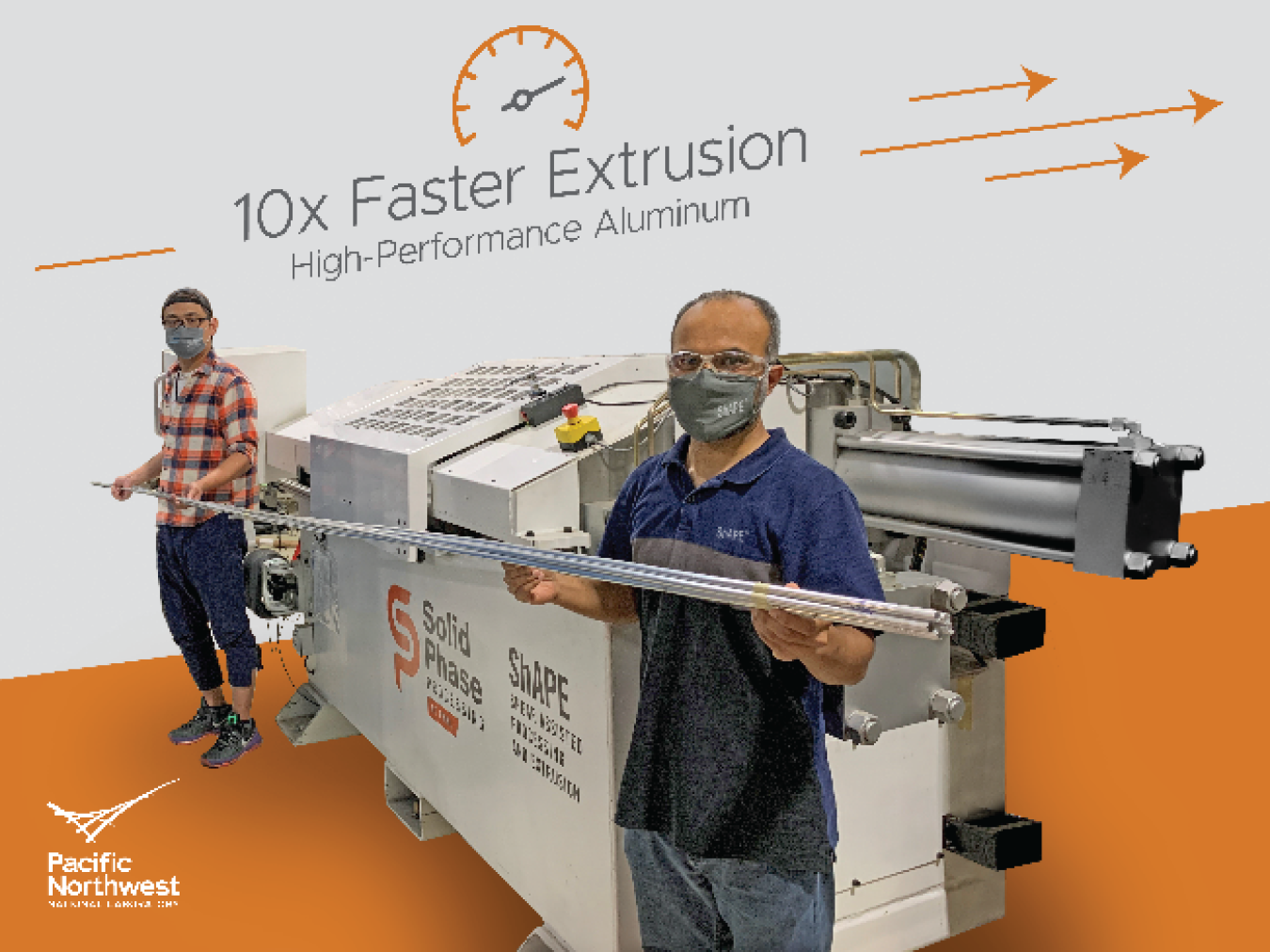In 2019, the Advanced Manufacturing Office (AMO) awarded Pacific Northwest National Laboratory (PNNL) $1.8M to develop new ways to manufacture high-performance aluminum alloy tubing with lower embedded energy and improved mechanical properties relative...
Advanced Materials & Manufacturing Technologies Office
July 26, 2022In 2019, the Advanced Manufacturing Office (AMO) awarded Pacific Northwest National Laboratory (PNNL) $1.8M to develop new ways to manufacture high-performance aluminum alloy tubing with lower embedded energy and improved mechanical properties relative to conventional methods. The process developed by PNNL reduces the cost of advanced and high-strength aluminum alloys, allowing for broader applications throughout the economy.
Aluminum alloys are used in automotive, aviation, aerospace, defense, and marine applications, among others. Aluminum alloys 7075 and 2024 are widely used in aviation due to their high strength-to-weight ratio compared to high-strength steels, but remain cost-prohibitive and too energy-intensive to manufacture for widespread adoption outside of the aerospace industry.
These challenges come primarily from the time-consuming extrusion processes in the manufacturing of aluminum tubing, in which heated metal is pushed through a die and cooled to take on the tube shape. Decreasing the time and energy needed to form tubes from these high-strength aluminum alloys can make the process of creating tubing from high-performance alloys more efficient—and reduce carbon emissions in the process.
With AMO funding, PNNL developed a new manufacturing approach to process high-strength aluminum alloys called Shear-Assisted Processing and Extrusion, or ShAPE™ to create aluminum tubing. Rather than using the conventional, linear motion of extrusion manufacturing that forces a feedstock billet through a die, ShAPE™ uses a rotational shear force to achieve the same desired result. This change imparts significantly more strain into the alloy feedstock material, manifesting a range of property and process improvements through the formation of novel microstructures. The result is high-performance aluminum alloy tubing with lower embedded energy and improved mechanical properties.

The ShAPE™ machine developed by PNNL with AMO funding with PNNL researchers
The novel ShAPE™ extrusion process developed by PNNL eliminates the need for heat-treating cast ingots and preheating the feedstock, decreasing the overall energy needed in ShAPE™ extrusion, while increasing the ability to produce tubing at a much higher rate than conventional processes. ShAPE™ significantly increases manufacture speed, demonstrating the production of 7075 alloy tubing at 12.2 meters/min compared to two meters per minute in conventional processes. Additionally, a techno-economic analysis of ShAPE™ conducted by the National Renewable Energy Laboratory found that the process could produce 7075 tubes while using roughly 70% less energy than conventional hollow tubes. PNNL’s ShAPE™ work enabled a scalable manufacturing pathway for high-performance structural components with improved mechanical properties at low cost. With the reduced cost and manufacturing energy requirements, advanced and high-strength metals like aluminum 7075 and 2024 can be used for applications where they were previously too expensive, including automotive, aviation, defense, and marine applications.
The project yielded several technological innovations, with PNNL filing for five patents for new process and tooling technologies over the course of the ShAPE™ project. PNNL was also awarded an R&D 100 Award and an Association of Washington Business Green Manufacturing Award related to ShAPE™. The key scientific discoveries made during the project are published in five peer reviewed materials and manufacturing process journals.
AMO, in a joint effort with the Vehicle Technologies Office and the State of Washington, has continued to scale-up and develop ShAPE™, most recently by co-funding research on a new ShAPE™ 2.0 machine. This larger machine, built by Indiana-based manufacturer BOND Technologies, incorporates higher torque and force along with innovations in advanced controls and sensors, and will enable the extrusion of more difficult materials such as steel and titanium, with new applications being developed in close coordination with industrial partners.
AMO supports innovative manufacturing processes such as ShAPE™ to advance both industrial decarbonization and U.S. manufacturing competitiveness by improving process energy efficiency and material performance at the same time.

